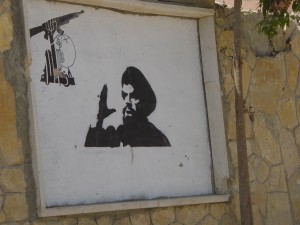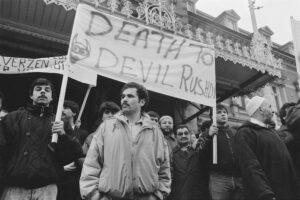Can Hizbullah reinvent itself?
As Hizbullah sides with its brutal backers in Damascus, are the Shi'ite movement's days numbered or can it regain its popularity and credibility?
Monday 27 February 2012

Many of the idealistic, youth-driven uprisings in the Arab world have been manipulated to serve a much bigger regional game, pitting revolutionary against counter-revolutionary forces, not to mention in-fighting between revolutionaries, with international powers vying to maintain or enhance their influence in the region.
The age-old rivalry between Russia and the West is being played out in the Middle East, pitting the largely Sunni Muslim Arab states against Russia's satellite in the region, Iran. An important player bridging the gap between Shi'ite Iran and the Arab Sunnis is Lebanon's Shi'ite resistance movement Hizbullah.
Hizbullah has enjoyed enormous popularity across the entire region, where it is perceived by many as the champion of the Arab cause, successfully standing up to the bully in the playground, Israel. There was a time when the portrait of Hassan Nasrallah hung on the walls of homes and cafes from Baghdad to Casablanca. Yet, following the relatively cool reception of Nasrallah's speech on 16 February , one got the distinct impression that the Lebanese resistance leader may not enjoy the same popularity he once did with the Arab masses.
A simple explanation might be Hizbullah's unequivocal support for Bashar el-Assad's regime in Syria. In a speech broadcast by al-Manar on 25 May 2011, Nasrallah declared his group's strong support for the Assad regime. He hailed Syria for its support of the resistance movement in Lebanon and Palestine. Many have been unable to comprehend why the former champions of the resistance would side with the regime against the people, especially considering their unreserved support for the uprisings in Egypt, Tunisia and Bahrain. This has eroded the party's popularity not only among Sunnis in Syria, who dominate the opposition, but also in the Arab world at large as regional tensions intensify between Shi'ite Iran and the predominantly Sunni Arab states.
Ironically, the very cause which won Hizbullah respect from thousands across the region also lost them the support of their own people. Throughout the 1990s, the Lebanese, regardless of sect, were united behind Hizbullah's resistance to the Israeli occupation of South Lebanon and again, in 2006, when Israel threatened re-invasion. Critics point to Hizbullah's reluctance to disarm as the main source of national instability. Samir Geagea, a veteran Lebanese politician and senior figure in the 14 March Alliance, asserted that: “The ones who are involving Lebanon [in crises] are those wielding power outside the Lebanese state,” demanding that Hizbullah lay down its arms and integrate itself with the official Lebanese army and government.
In a similar vein, Hizbullah has alienated many followers by becoming embroiled in a petty tit-for-tat exchange with the 14 March coalition over the Special Tribunal for Lebanon, which was charged with investigating the 2005 assassination of former Prime Minister Rafiq el-Hariri. In the past, many, regardless of their politics, had respected Nasrallah for his commitment to his cause and ability to avoid entanglement in party politics.
Though not Hizbullah's fault, as such, the persisting devastation of the socio-economic condition and infrastructure of South Lebanon has also served as a harsh reminder, to the organisation's critics, of the consequences of war.
In The Asia Times, Sami Moubayed, describes Hassan Nasrallah's total withdrawal from public life in Lebanon in recent years, choosing, instead, to address his supporters on live television rather than the massive public rallies for which he has been famed. His disappearance has been due to security fears. However, this has made it difficult for followers to connect with him. It is also now harder to draw in new supporters from across the Arab and Islamic worlds.
Despite its somewhat dented popularity, Hizbullah is still massively important on a strategic level.
In a speech broadcast by al-Manar on the 25 August 2011, Nasrallah named Syria as a vital ally in the region. “Syrian support has been crucial. A great deal of the Iranian support comes through Syria. If it had not been for the will of Syria, even the Iranian support would have been blocked,” he claimed. So, it is reasonable to assume that the fall of the Assad regime would serve as a tremendous blow to Hizbullah, and would also act as the catalyst for a power struggle within the country. A regime in Syria based on the Sunni Muslim majority would most likely be friendly to Hizbullah's local rivals in the 14 March coalition. Such a regime would likely also develop good ties with regional powers opposed to the Hizbullah movement over sectarian and political issues.
A post-Assad Syria may prompt Hizbullah, in order to ensure its political survival, to integrate fully into the Lebanese politics and military. Since its inception, Hizbullah has proven itself to be a resilient, relevant, military and political force within Lebanon as well as across the Middle East. The organisation has already undergone many changes, but can it continue to transform itself and achieve success in being perceived as a legitimate political actor participating in Lebanese government?
Political integration is problematic for Hizbullah, since it must balance its need to be a legitimate actor within Lebanon's political system with its continued insistence on ‘resistance' to Israel, despite Israel's withdrawal and the growing domestic opposition to the movement's confrontationalism. In addition, Hizbullah must contend with the question of whether greater integration into the Lebanese political landscape will advance or set back its ability to represent the interests of the politically and economically marginalised Shi'ite community. Though difficult, achieving a balance of these various interests is not impossible, although Hizbullah may have to update its stance on various issues if it is to succeed.
Hizbullah finds itself in the unenviable position of choosing between its Iranian financial backer and its Arab popular support base. The Shi'ite movement may need to tone down its fiery rhetoric and work harder at integrating itself further into Lebanese mainstream politics without becoming enmeshed in petty disputes and factionalism. This is by no means an easy task, but it is one that Hizbullah will have to rise to if it is to maintain its significance and standing.
This article is published here with the author's consent.


Excellent article!
Pingback: Can Hizbullah reinvent itself?